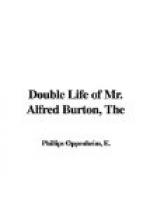Burton looked at the list which the boy produced, and groaned to himself.
“My dear Alfred,” he protested, “these books are for almost grown-up people.”
The boy smiled confidently.
“Mr. Denschem gave me the list, father,” he repeated simply.
After lunch, Burton took the boy round to Mr. Waddington’s office. Mr. Waddington was deep in a book of engravings which he had just purchased. He welcomed Burton warmly and gazed with surprise at the child.
“Alfred,” his father directed, “go and sit in that easy-chair for a few minutes. I want to talk to Mr. Waddington.”
The child obeyed at once. His eyes, however, were longingly fixed upon the book of engravings.
“Perhaps you would like to have a look at these?” Mr. Waddington suggested.
Alfred held out his hands eagerly.
“Thank you very much,” he said. “It is very kind of you. I am very fond of this sort of picture.”
Burton took Mr. Waddington by the arm and led him out into the warehouse.
“Whose child is that?” the latter demanded curiously.
“Mine,” Burton groaned. “Can you guess what has happened?”
Mr. Waddington looked puzzled.
“You remember the day I went down to Garden Green? You gave me two beans to give to Ellen and the child. It was before we knew that their action was not permanent.”
“I remember quite well,” Mr. Waddington confessed.
“You remember I told you that Ellen threw them both into the street? A man who was wheeling a fruit barrow picked up one. I told you about that?”
“Yes!”
“This child picked up the other,” Burton declared, solemnly.
Mr. Waddington stared at him blankly. “You don’t mean to tell me,” he said, “that this is the ill-dressed, unwashed, unmannerly little brat whom your wife brought into the office one day, and who turned the ink bottles upside down and rubbed the gum on his hands?”
“This is the child,” Burton admitted.
“God bless my soul!” Mr. Waddington muttered.
They sat down together on the top of a case. Neither of them found words easy.
“He’s taken to drawing,” Burton continued slowly, “hates the life at home, goes out for walks with the schoolmaster. He’s got a list of books to read—classics every one of them.”
“Poor little fellow!” Mr. Waddington said to himself. “And to think that in three weeks or a month—”
“And in the meantime,” Burton interrupted, “here he is on my hands. He’s run away from home—as I did. I don’t wonder at it. What do you advise me to do, Mr. Waddington?”
“What can you do?” Mr. Waddington replied. “You must keep him until—”
“Upon children,” Burton said thoughtfully, “the effect may be more lasting. No news, I suppose, of the tree?”
Mr. Waddington shook his head sorrowfully. “I’ve had a private detective now working ever since that day,” he declared. “The man thinks me, of course, a sort of lunatic, but I have made it worth his while to find it. I should think that every child in the neighborhood has been interviewed. What about the novel?”




